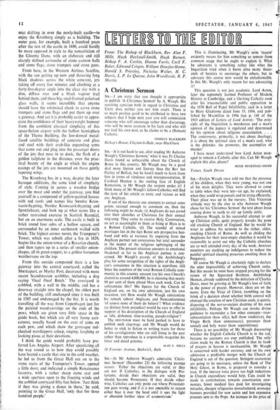SIR,—In Mr Auberon Waugh's admirable 'Christ- mas Sermon' (December 23)
the following passage occurs: 'Either the objections are valid, or they are not. If Catholics, in the dialogue with Pro- testants, • decide their objections are valid, they should become Protestants. If they decide other- wise, Catholics can only point out where Protestant- ism goes wrong, and if it is not amenable to reason either beat it over the head until it sees the light or abandon further ideas of ecumenicism.'
This is illuminating. Mr Waugh's term 'reason' evidently means for him something so remote from common usage that he ought to explain it. What he advocates is something rather like what the. Inquisition tried when it burnt alive many thous- ands of heretics to encourage the others, but. to advocate this course now would be unfashionable. Is this Mr. Waugh's only reason for not advocating it?
This question is not just academic. Lord Acton, later the supremely learned Professor of Modern. History at Cambridge, and a life-long Catholic even after his irreconcilable and public opposition to the 1870 Bull of Papal Infallibility, said in a letter to Mary Gladstone dated June 19, 1884, and pub- , lished by Macmillan in 1904 (see p. 148 of the 1913 edition of Letters of Lord Acton): 'The prin- ciple of the Inquisition is murderous and a man's opinion of the papacy is regulated and determined by his opinion about religious assassination. . . . The controversy, primarily, is not about theology; it is about the spiritual state of a man's soul, who is the defender, the promoter, the accomplice of murder.'
I have never understood how Lord Acton man- aged to remain a Catholic after this. Can Mr Waugh explain this also, please?






























 Previous page
Previous page